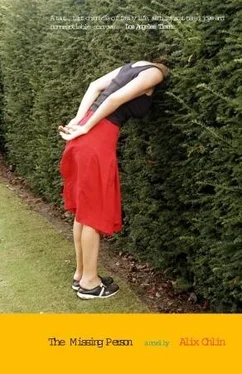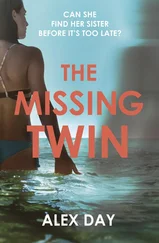Alix Ohlin
The Missing Person
To David and Eleanor Rice
I’m very grateful to the Michener Center for Writers in Austin, Texas, where I started this book, and to Portsmouth Abbey School in Portsmouth, Rhode Island, where I finished it. For their support and encouragement over many years I also owe big, big thanks to Amy Williams, Gary Fisketjon, my friends, and my family. All writers should be as lucky as I have been.
Days started in Brooklyn with bright, compromised light. I’d been sleeping late. In the mornings, the blinds sending geometric stripes across the sheets, I kept willing myself to wake up, then slept again, fifteen minutes each time. Construction and conversation, dogs barking their greetings, the irritated beeping of vehicles in reverse — none of it could get me out of bed. By the time I got up, it seemed too late to bother doing anything; the day was almost gone. This was a problem I’d been having.
The phone rang early in the morning, early in June.
“Lynn,” my mother said. She was panting slightly, as if she’d been running to the phone, though hadn’t she placed the call? “I didn’t think you’d be home. You’re always at the library, or teaching, I thought.”
“I almost always am,” I said, pulling back the covers and pushing myself finally out of bed. I opened the blinds and looked out through the grate. Across the street from me, between the pet store and the souvlaki place, was a psychic’s office. A neon crystal ball — blue pedestal, red base, under a pair of cajoling hands — stayed lit in the window twenty-four hours a day. The psychic herself was a stocky woman with long frizzy hair, given to flowery housecoats and red lipstick. I sometimes watched her sit in the window drinking coffee and smoking cigarettes, gazing out at the street. I never saw anybody go in there. What did she do all day, and how did she survive? I’d lived across from her for three years, ever since I started graduate school, but still I often asked myself these pressing questions.
“Lynn,” my mother said again. “So what do you think I should do?”
“About what?”
“I’ve been talking,” she said. “By convention, on the telephone, one person talks while the other listens. People have agreed that this is the best way to approach it. Do you have a different idea?”
“Sorry. My attention must have drifted there for a minute. I just got up.”
“It’s ten o’clock!”
“I was up late, um, studying.”
“I’ve been up for hours. I couldn’t sleep. I’m worried about Wylie, and I thought, I’ll call Lynn, she always knows how to handle him, she can communicate, and now you’re not even listening.”
“What’s wrong with Wylie?”
“He cut off his phone. He lives like a monk and weighs about as much as a tin can. An empty tin can. Not only that— he won’t speak to me. I have one child who won’t speak to me in person and another who won’t listen to me on the phone.”
“I’m listening.”
This she ignored. “I want you to come home.”
“To Albuquerque?” I gave a shudder I hoped was inaudible and went into the kitchen to make coffee, cradling the phone against my shoulder.
“Don’t take that tone,” my mother said. She seemed to have heard the shudder, which was an uncanny ability of hers.
“What tone is that?”
“The I’m-too-good-for-Albuquerque tone. You’ve had it ever since you moved to New York.”
“I hated Albuquerque just as much when I still lived there.”
“I don’t know why. You’re just like Wylie, do you know that? You have all these objections that don’t even make sense.”
“Mom,” I said, “I feel like we’re not actually getting anywhere in this conversation.” Across the street the psychic entered the window and stood with her arms folded, a cigarette tense between her fingers. The souvlaki guy, passing by her window, waved good morning. With slow elegance she raised her eyebrows and blew a perfect smoke ring, and he laughed.
“It’s those eco-freaks,” my mother said plaintively. “Wylie’s friends. They’ve turned him against me. He won’t call, won’t come over for dinner. He says he’s breaking away. He says I’m too complicit, but I don’t think it’s complicit to cook him a hot meal. I don’t even know what I’m complicit in, do you?”
“I’m not sure. The dominant paradigm?”
“I’m a travel agent,” my mother said, “not a paradigm.” Sorrow and annoyance chimed together in her voice, a mother’s chord.
“I know,” I told her. We observed a moment of silence. Afterwards a gentle plastic rattle came through on the line, the sound of my mother’s short manicured nails against her keyboard, and I realized she was calling from work.
“I’m booking you a ticket. We have some great deals through Minneapolis.”
“Don’t do that, Mom.”
“I’m not taking no for an answer.”
“No,” I said.
“What did I just say? We’ve got great deals. Minneapolis is desperate for flights. They’ll do anything. They’ll pay you to fly there, practically. Listen, I’m pressing a button. I’m confirming. I’ll e-mail you the reservation.”
“Don’t do that,” I said.
“You’re coming home.”
Outside, summer heat was putting pressure on the day. My super, Guhan, stood by the door rifling through the building’s garbage cans, sweat inking a line down the back of his Yankees T-shirt. He was very nosy and went through everybody’s garbage, supposedly to make sure all the right paper got recycled. When he saw me he grunted. Originally he’d helped my old roommate — a dark-haired, six-foot-tall Swiss woman from my art history program — get a rent-stabilized apartment in the building. I moved in; then Suzanne finished her dissertation on a little-known Swiss surrealist and went back to Bern. For months afterwards Guhan kept asking me when she was coming back. Now he just sighed, eternally disappointed by what was left.
The street smelled of coffee in paper cups, car exhaust, perfume that had just been sprayed too strongly in the privacy of apartments, dog turds baking in the sun. I crossed the street and passed the psychic, gone now, and the pet store, where mangy kittens lay curled in the window in sad, scruffy balls. I bought a coffee and a paper to read on the subway. All the news involved natural disasters in faraway places: earthquakes, droughts, fires, floods.
A man wearing fake breasts under a black dress came on the train and sang a Spanish song while shaking his hips and holding his palm out for money, which nobody gave.
The woman beside me, middle-aged, short-haired, and suited, fell asleep, her tired face smearing makeup against my shoulder.
I thought about Wylie, my baby brother, fat and jolly when he was little, tall and bony and righteous now. Our father had died two years ago, when his heart suddenly failed him; it was quick and painless, the doctor said. I went home for the funeral and stood with my mother and brother at the grave-side, thinking that these were the most appropriate words for death I could imagine: “heart” and “failure.” Ever since then, Wylie’d been getting both thinner and more radical. These days he was some kind of environmental crusader, a haranguing activist with a philosophical bent. He supposedly was finishing his biology degree at UNM, but only registered for one class a semester. My mother often said he took after my father, who was a scientist; but my father had a Ph.D. and a job at a lab, whereas Wylie was twenty-four and years away from any degree at all. Instead of doing course work, he devoted his time to writing his undergraduate thesis, a massive opus “about all of nature, ” as my mother told me on the phone when I asked why it was taking so long. The opus seemed to have more to do with ideology than biology, and sometimes he sent me chunks of it by e-mail, in the middle of the night, after too much beer: The desert is deconstruction in practice, not theory; an experience that dismantles the border of the self and defies the human (frequently but not always male) sense of authorship, the idea that people create their own reality. In this Derridean context we can locate a species of alternative to the institutional structures of civilization. Not by fixing but by decentering us, wilderness puts us in our place in the world. It is a narrative that cannot be controlled by the participant.
Читать дальше












